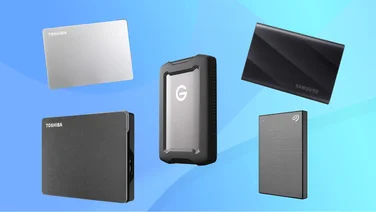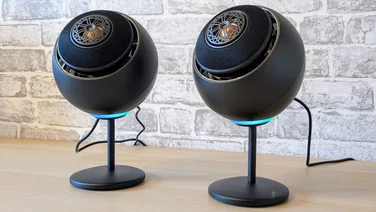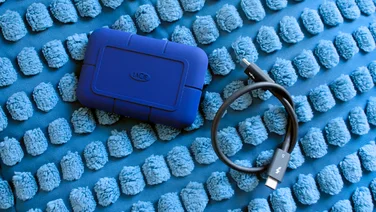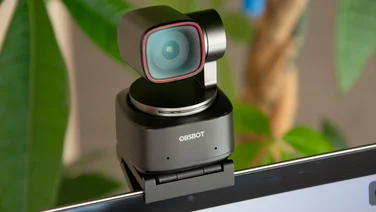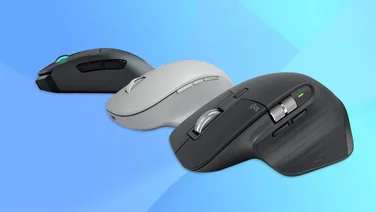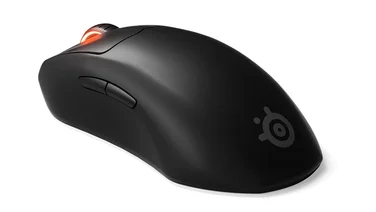To help us provide you with free impartial advice, we may earn a commission if you buy through links on our site. Learn more
- Best external drive for Xbox Series X/S: At a glance
- How we test Xbox Series S/X hard drives
- The best external drives for Xbox Series X and Xbox Series S
- 1. Toshiba Canvio Flex 2TB: Best value hard drive for Xbox Series X/S
- 2. Seagate FireCuda Gaming Hard Drive: Best high-performance hard drive for Xbox Series X
- 3. Seagate Storage Expansion Card 1TB: Best Xbox expansion card
- 6. Crucial X8 Portable SSD 1TB: Best value SSD for Xbox Series X
- 5. Samsung T7 1TB: Best high-performance SSD for Xbox Series X
- How to choose the best external hard drive for your Xbox Series S/X

If you’re after one of the best external hard drives for your Xbox Series X or S, it can only mean one thing: you’re not happy with the amount of built-in storage space. And your mood wouldn’t be unjustified: the Series S has only 364GB of usable storage, while the Series X has 802GB. Start installing a few games and you can soon pack it out.
A full install of Call of Duty: Modern Warfare II with the Warzone 2.0 Battle Royale mode will take well over 100GB on the internal SSD. Ditto for Forza Horizon 5. Go for Starfield, and you’re looking at around 125GB. Sign up to Xbox Games Pass and make use of its extensive library, and you could see your available storage space reduced to zero before you know it.
Microsoft has an easy solution. Seagate and Western Digital have produced expansion cards that plug into the back of the console and increase the storage by either 500GB or 1TB. Since these run at the same speed with the same bandwidth as the internal SSD, you can run Series S/X-specific games straight from them. All the same, they’re fairly expensive – and there’s another way to increase your storage: you could just plug in an external hard drive or SSD instead.
Best external drive for Xbox Series X/S: At a glance
| Best SSD for Xbox Series X | Samsung T7 | |
| Best value hard drive for Xbox Series X | Toshiba Canvio Flex 2TB | |
| Best Xbox expansion card | Seagate Storage Expansion Card 1TB |
How we test Xbox Series S/X hard drives
We run two sets of tests when we’re looking at external hard drives for the Xbox Series S and Series X. First, we connect them to a PC and run the CrystalDiskMark benchmark to test their raw sequential and random read/write speeds. Sequential speeds are an indication of how fast the drive can read or write large quantities of data in one sustained burst, which makes a big difference when you’re first running a game, loading a saved game, streaming in all the models and textures in a level, or transferring a game from one drive to another. Random read/write speeds cover smaller data transfers, and make an impact when you’re running a game directly from the hard drive.
After these initial tests, we connect the drive to an Xbox Series S and time how long it takes to copy a game from the internal drive to the external hard drive and back again. We then test how long it takes to load a series of demanding Xbox games, and then how long it takes to load the same saved game on each one. Drives that take longer to load a saved game will keep you waiting longer while new levels or areas load, or when you have to restart after dying.
READ NEXT: The best external hard drives for PS5
The best external drives for Xbox Series X and Xbox Series S
1. Toshiba Canvio Flex 2TB: Best value hard drive for Xbox Series X/S
Price when reviewed: £64 | Check price at Amazon

While Toshiba sells a gaming-specific version of its Canvio external HDD, the Canvio Flex is the current king when it comes to price, performance and value. It’s cheaper than most competitors, yet also one of the fastest portable HDDs we’ve tested. Our PC benchmarks place its sequential read/write speeds over a USB 3.2 Gen 1 Type A connection at 151.5MB/sec and 158.9MB/sec, and there’s precious little in it between the Canvio Flex and Canvio Gaming when it comes to random read/write speeds. Plugged into the Xbox Series X, it’s very competitive with the Seagate FireCuda Gaming Hard Drive, taking four seconds longer to load a saved game in Prey, but coming first by just under three seconds in Red Dead Redemption 2. You can also save a minute or so over slower drives when it comes to moving or copying installed games. Sure, it’s nowhere near as speedy as an SSD, but if you just want a drive for archiving Series S/X games and playing your old Xbox One favourites, this could be all you need.
Key specs – Type: Portable HDD; Connectivity: USB 3.2 Gen 1; Spindle speed: 5,400rpm; Size: 111 x 89 x 13.5-19.5mm
2. Seagate FireCuda Gaming Hard Drive: Best high-performance hard drive for Xbox Series X
Price when reviewed: From £68 | Check price at Amazon

There are some cosmetic reasons to go for the FireCuda Gaming Hard Drive, not least that it comes in a range of different designs featuring classic Xbox heroes and Marvel and Star Wars fan favourites. Like the FireCuda SSD, it also has a cool illuminated bar on the front edge that flashes when the drive is busy. Yet the real reason to pay a little extra is that its performance is very good. On paper, the Toshiba Canvio Flex has faster sequential read/write speeds, while its random read/write speeds aren’t far behind. In practice, though, we found the FireCuda slightly faster to load some games and two or three seconds faster when loading save games, although the Toshiba had the edge on Prey. The difference isn’t that significant, but if you like the styling then this drive won’t let you down when it comes to performance.
You can pick the FireCuda up as a 1TB, 2TB (£75) and 5TB (£129) on Amazon.
Key specs – Type: Portable HDD; Connectivity: USB 3.2; Spindle speed: 5,400rpm; Size: 119 x 80 x 14-20mm
3. Seagate Storage Expansion Card 1TB: Best Xbox expansion card
Price when reviewed: £150 | Check price at Currys

Costing almost half the price of the Xbox Series X (£220), and just £80 less than the full price of a Series S, Seagate’s high-bandwidth PCIe NVMe card uses the same type of storage as the internal drive and is currently the only way to play ‘Optimised for Xbox Series X’ games from an external source. What this means is that while other drives will allow you to store next-gen games, you won’t be able to play them without transferring the data to the console’s internal storage first.
An added benefit, of course, is that the Seagate Storage Expansion Card is also extremely fast, and we were able to transfer the entire 104.6GB Red Dead Redemption 2 file in less than three minutes during our tests. If you’ve got the money, and you’re fast approaching the upper limits of your Xbox’s internal storage, then there’s simply no better external storage option at the moment.
Key specs – Type: Portable SSD; Connectivity: Proprietary PCIe 4.0 connector (2.4GB/sec)
6. Crucial X8 Portable SSD 1TB: Best value SSD for Xbox Series X
Price when reviewed: From £57 | Check price at Crucial

The Crucial X8 is another great option, especially if you can catch it in a sale. While it’s normally priced at the same kind of level as the Samsung T7, the 1TB and 2TB options have dropped to under £100 in recent deals, which made it the best storage bargain in town. It’s another 1050MB/sec drive, so there’s little between it and the WD My Passport Portable and Samsung drive when it comes to gaming performance, minimising any wait while your last-gen favourites load and reload, or while you transfer games from external storage to the internal HDD. If you spot it cheap, don’t wait; just bag it. If not, any of these drives will do the job.
Key specs – Type: Portable SSD; Connectivity: USB 3.2 Gen 2 (max 10Gbits/sec), USB-C; Max read speed: 1,050MB/sec
5. Samsung T7 1TB: Best high-performance SSD for Xbox Series X
Price when reviewed: From £99 | Check price at Amazon

The Samsung T7 was once the fastest portable SSD around, and it’s still a hugely popular drive. It’s a sleek, fantastically robust little drive with an aluminium unibody, available in blue, red or titanium grey. It also comes with both a USB-C cable and the USB-A cable you’ll need for the new Xbox consoles. In our tests it was, at worst, a second or two slower to load games than the internal SSD, while in some cases performance was virtually identical. The only catch is that the T7 still commands quite high prices, so you could save some cash with one of its rivals.
Key specs – Type: Portable SSD; Connectivity: USB 3.2 Gen 2 (max 10Gbits/sec), USB-C; Max read speed: 1,050MB/sec
How to choose the best external hard drive for your Xbox Series S/X
What can you do with an external drive?
Now, external drives have their limitations. At the moment, the Seagate Expansion Card is the only storage product that will run games developed for the Xbox Series S and Series X or optimised for the new consoles. Give it time and build up a decent library of games, and you’ll probably need one of these, or face deleting some of your favourites.
However, external drives can still be really useful. First, you can install any existing Xbox One games from your library to an external drive and run them from there – and the same applies to any last-generation games you download using Xbox Games Pass. You can keep your favourite backwards-compatible titles on external storage and leave the internal storage for the latest Series S or Series X games.
Second, you can store Xbox Series S or Series X games on an external drive, then move them to the internal storage when you want to play them. It’s really easy to move them between the two, and a lot faster than deleting a game because you need the space then having to re-download it.
Does the type and speed of the drive matter?
Yes it does, but maybe not as much as you’d think. We tested a range of HDDs and SSDs with an Xbox Series S to find out. These included an external HDD (the Seagate Backup Plus Slim), a basic SSD using the old SATA-6 interface (the LaCie Mobile SSD), a high-performance 2000MB/sec NVMe SSD (the latest SanDisk Extreme Pro) and three 1050MB/sec NVMe SSDs (see below). We also tested the expensive Seagate Storage Expansion card on an Xbox Series X.
We timed the process of copying Star Wars Jedi: Fallen Order to each one, then timed how long the game took to load and how long it took to load a saved game from the main menu. We also ran some tests with Red Dead Redemption 2, to find out what impact different drives had on its notoriously lengthy load times. Finally, we timed how long it took to copy Fallen Order back from the external drive to the internal SSD. A quick note: since the Seagate Expansion Card was tested by a different member of staff, save data load times will differ slightly from the other results.
| Internal SSD | Seagate Storage Expansion Card | SATA-6 HDD | 2,000MB/sec NVMe SSD | 1,050MB/sec NVMe SSD | |
| Move Fallen Order (Xbox to Drive) | n/a | 01.14.31 | 06.02.94 | 02.22.34 | 02.52.65 |
| Load Fallen Order | 00.52.46 | 0.54.71 | 00.56.63 | 00.51.63 | 00.53.93 |
| Load Fallen Order Saved game | 00.16.86 | 0.17.84 | 00.20.57 | 00.15.73 | 00.16.52 |
| Load RDR2 (from account picker) | 00.20.99 | 0.20.91 | 00.21.61 | 00.20.86 | 00.20.92 |
| Load RDR2 Saved game | 00.54.27 | 0.38.41 | 01.14.16 | 00.56.87 | 00.56.43 |
| Move Fallen Order (Drive to Xbox) | n/a | 01.27.62 | 5.04.37 | 02.32.74 | 02.33.23 |
As you’ll quickly spot, the Seagate Backup Plus external HDD is significantly slower than any of the SSDs, particularly when it comes to copying games to and from internal storage. However, when it comes to loading games and loading saved games, the difference isn’t actually that painful. Sure, with Read Dead Redemption 2 you’re looking at an extra 18 to 20 seconds while you wait for each saved game to load, but with Fallen Order, it’s more in the range of three to five seconds, which isn’t bad at all.
Move up to the SSDs and there is a difference between the slowest SSD with an old-school SATA interface and the newer models based on NVMe technology, but we’re talking about just a few seconds at most. And once you move from the 1050MB/sec drives to the ludicrously speedy SanDisk Extreme Pro, which can reach 2000MB/sec, there’s barely anything in it. It’s also worth noting that running backwards-compatible titles from one of these drives isn’t any slower than running them from the internal SSD. In fact, sometimes it’s ever-so-slightly faster!
This doesn’t mean that you could theoretically run native Series S and Series X games from an external USB 3.0 drive – true next-generation titles are built to make the most of Microsoft’s new storage subsystems – but if you’re running backwards-compatible games you won’t be missing out. The Seagate Storage Expansion Card, on the other hand, beats everything else we’ve currently tested when it comes to data transfer speeds. As a point of comparison, the Seagate Storage Expansion Card is almost 50% faster at transferring Jedi Fallen Order from the console to external storage than the next best drive, the SanDisk Extreme Pro. Load times are much the same, however.
How much space do you need?
The other thing you need to think about is capacity. You can now buy most SSDs in 1TB and 2TB formats, but they don’t come cheap. Outside of the big sales, you’re looking at between £120 and £180 for a 1TB drive and between £200 and £300 for a 2TB drive. If you’re prepared to deal with the slower speeds of an HDD, you can find 4TB drives for well under £100 – and you can cram an awful lot of games on one of those.
What about the interface?
The Xbox Series S and Series X consoles both have bog-standard USB 3.0 ports (or USB 3.2 gen 1 as we’re now supposed to call them). We’re now seeing many SSDs come with USB-C cables, but in most cases they’ll also ship with a second USB Type-C to Type-A cable or adapter. The lack of faster ports on the new consoles is another good reason not to go too high-end on your drive, as some of the fastest and most expensive can only unleash their extra performance over a USB 3.2 gen 2 connection, which neither of the new Xbox consoles possesses. Bear in mind, though, that we did see some speed improvements with the fastest drives, all the same, especially when copying massive games.





